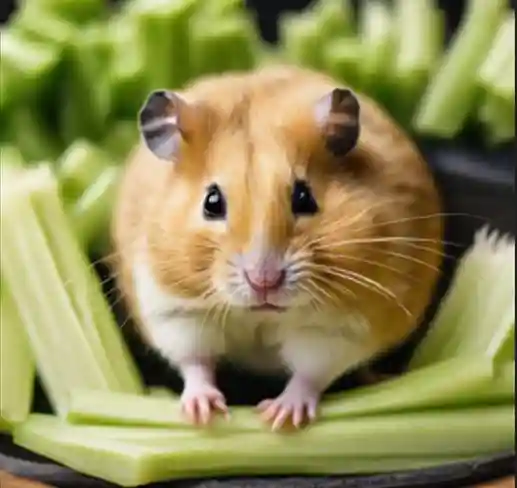If you have a pet hamster, you might be wondering what kind of treats you can give them besides their regular food. Fruits and vegetables are often a good choice, as they provide vitamins, minerals, and antioxidants that can benefit your hamster’s health. However, not all fruits and vegetables are safe for hamsters, and some can cause digestive problems or other issues. In this article, we will answer the question: Can hamsters eat celery?
What is celery? Can hamsters eat celery?

Celery is a crunchy vegetable that belongs to the same family as carrots, parsley, and fennel. It has long green stalks and leaves that are often used in salads, soups, and snacks. Celery is low in calories and high in water content, making it a refreshing and hydrating food. Celery also contains various nutrients, such as vitamin A, vitamin K, folate, potassium, and fiber.
Is celery safe for hamsters?

Yes, celery is safe for hamsters to eat in small amounts and in moderation. Celery can provide some benefits for your hamster, such as:
- Hydration: Celery is about 95% water, which can help keep your hamster hydrated and prevent dehydration. Dehydration can cause serious health problems for hamsters, such as kidney failure, urinary tract infections, and heatstroke.
- Fiber: Celery is a good source of fiber, which can help your hamster’s digestion and prevent constipation. Fiber can also help your hamster feel full and prevent overeating and obesity.
- Antioxidants: Celery contains antioxidants, such as vitamin C, beta-carotene, and manganese, which can help protect your hamster’s cells from oxidative stress and damage. Oxidative stress can lead to chronic diseases such as cancer, diabetes, and heart disease.
- Dental health: Celery is a crunchy vegetable that can help your hamster’s dental health by wearing down their teeth and preventing overgrowth. Hamsters have teeth that grow continuously throughout their lives, and they need to chew on hard foods to keep them at a proper length and shape. Overgrown teeth can cause pain, infection, and difficulty eating.
How much celery can hamsters eat?

While celery is safe for hamsters, it should not make up a large part of their diet. Celery should be given as an occasional treat, not a staple food. Too much celery can cause some problems for your hamster, such as:
- Diarrhea: Celery is high in water and fiber, which can cause diarrhea if your hamster eats too much of it. Diarrhea can lead to dehydration, electrolyte imbalance, and weight loss. It can also indicate an underlying health issue, such as bacterial infection, parasite infestation, or food intolerance.
- Bloating: Celery contains a compound called mannitol, which can cause bloating and gas in some hamsters. Bloating can cause discomfort, pain, and a reduced appetite. It can also interfere with your hamster’s breathing and circulation.
- Nutritional imbalance: Celery is low in calories, protein, fat, and some essential vitamins and minerals that your hamster needs. If your hamster eats too much celery, they might not get enough of these nutrients from their regular food. This can lead to nutritional deficiencies, which can affect your hamster’s growth, development, and immunity.
The amount of celery that you can give your hamster depends on their size, species, and individual preferences. As a general rule, you can give your hamster a small piece of celery (about the size of half a teaspoon) two to three times a week.
You can also vary the type of vegetables that you give your hamster, such as carrots, broccoli, cucumber, and lettuce, to provide them with a variety of nutrients and flavors.
How to prepare celery for hamsters?

Before you give celery to your hamster, you need to prepare it properly to ensure their safety and enjoyment. Here are some tips on how to prepare celery for hamsters:
- Wash the celery thoroughly to remove any dirt, pesticides, or bacteria that might be on it.
- Cut the celery into small pieces that are easy for your hamster to chew and swallow. Avoid giving your hamster whole or large pieces of celery, as they can pose a choking hazard or cause intestinal blockage.
- Remove the leaves and strings from the celery, as they can be too tough or fibrous for your hamster to digest. You can also peel the celery to make it softer and smoother.
- Introduce the celery gradually to your hamster, starting with a tiny piece and increasing the amount over time. This will help your hamster get used to the new food and avoid any adverse reactions.
- Monitor your hamster’s reaction to the celery, such as their appetite, behavior, and stool. If your hamster shows any signs of discomfort, diarrhea, or allergy, stop giving them celery and consult your veterinarian.
- Store the celery in a sealed container in the refrigerator and use it within a week. Do not give your hamster spoiled or moldy celery, as it can make them sick.
- Remove any uneaten celery from your hamster’s cage after a few hours, as it can rot and attract pests.
Conclusion
Celery is a safe and healthy treat for your hamster, as long as you give it in moderation and prepare it properly. Celery can provide your hamster with hydration, fiber, antioxidants, and dental health benefits. However, too much celery can cause diarrhea, bloating, and nutritional imbalance. Therefore, you should limit the amount of celery that you give your hamster to a small piece two to three times a week and vary the type of vegetables that you offer them.
You should also wash, cut, peel, and introduce the celery gradually to your hamster and monitor their reaction to it. By following these guidelines, you can ensure that your hamster enjoys celery safely and happily.
Frequently Asked Questions (FAQs)
Can hamsters eat celery stalks?
Yes, hamsters can eat celery stalks. It’s a safe and healthy snack for them. Make sure to cut it into small, manageable pieces to prevent choking.
Can hamsters eat celery leaves?
Yes, hamsters can also eat celery leaves. These leaves are safe and can be a part of their balanced diet. Just like with the stalks, ensure they are cut into small, hamster-sized portions.
Is hay safe for hamsters?
Yes, hay is generally safe for hamsters. It can be a good addition to their diet and help with their dental health. However, it’s essential to choose hay that is free from pesticides or chemicals. Timothy hay is a popular choice for hamsters.
What vegetables can hamsters not eat?
Hamsters should avoid certain vegetables to stay healthy. Foods like onions, garlic, leeks, and chives can be harmful to them. Additionally, raw potatoes and rhubarb are best kept out of their diets due to their potential toxicity. It’s important to provide a balanced and safe diet for your hamster.
What is a hamster’s favorite vegetable?
Hamsters enjoy vegetables like carrots, broccoli, and cucumber. These can be tasty and nutritious treats for them. It’s a good idea to offer a variety of vegetables to see which ones your hamster likes best.







Leave a Comment
You must be logged in to post a comment.